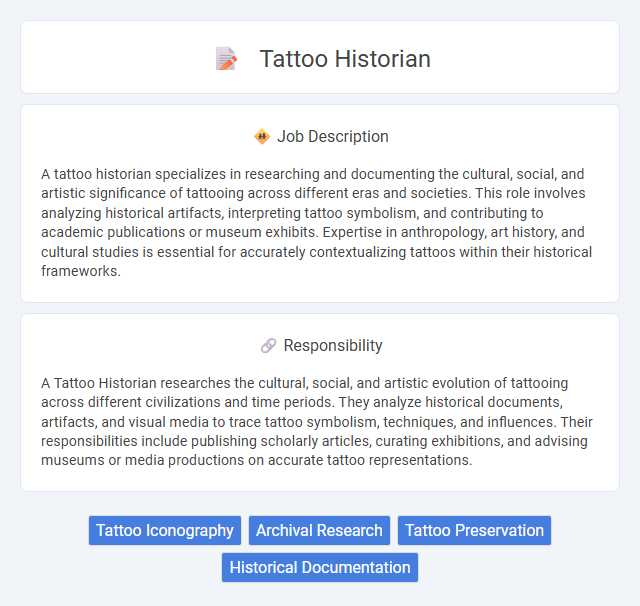
A tattoo historian specializes in researching and documenting the cultural, social, and artistic significance of tattooing across different eras and societies. This role involves analyzing historical artifacts, interpreting tattoo symbolism, and contributing to academic publications or museum exhibits. Expertise in anthropology, art history, and cultural studies is essential for accurately contextualizing tattoos within their historical frameworks.
Individuals with a strong passion for history and art are likely suitable for a tattoo historian role, as the job demands extensive research and attention to cultural contexts. Those who enjoy detailed analysis and have patience for archival work probably find this career fulfilling, while people uncomfortable with solitary work or lacking interest in historical documentation may find it less fitting. Physical health conditions are generally not restrictive, although the ability to work at a computer for long periods and occasionally visit museums or tattoo studios could influence suitability.
Qualification
A tattoo historian typically holds a degree in anthropology, history, or cultural studies, complemented by specialized training or experience in tattoo art and its cultural significance. Expertise in archival research, ethnography, and art history is essential to analyze tattoo traditions across different societies. Strong analytical skills and knowledge of tattoo techniques, symbolism, and historical trends enable accurate documentation and interpretation of tattoo history.
Responsibility
A Tattoo Historian researches the cultural, social, and artistic evolution of tattooing across different civilizations and time periods. They analyze historical documents, artifacts, and visual media to trace tattoo symbolism, techniques, and influences. Their responsibilities include publishing scholarly articles, curating exhibitions, and advising museums or media productions on accurate tattoo representations.
Benefit
A career as a tattoo historian likely offers the benefit of deepening understanding of cultural and artistic expressions across different periods, enriching knowledge of societal trends and symbolism. It probably provides opportunities to contribute to academic research, museum curation, and preservation of tattoo heritage, enhancing professional reputation. The role may also foster connections within the tattoo community and academic circles, promoting interdisciplinary collaboration and public education.
Challenge
Tattoo historians likely face the challenge of piecing together fragmented and often undocumented cultural histories, which requires extensive research and verification from limited sources. The probability of encountering conflicting interpretations demands critical analysis and a balanced approach to preserve the accuracy of tattoo heritage. Navigating sensitive cultural contexts may also pose difficulties in ensuring respectful representation of diverse tattoo traditions.
Career Advancement
A tattoo historian specializes in researching and documenting the cultural, social, and artistic evolution of tattooing across different societies and eras. Career advancement in this field often involves gaining expertise through advanced degrees in history, anthropology, or art history, and publishing scholarly articles or books on tattoo culture. Networking with museums, cultural institutions, and tattoo industry professionals can lead to curatorial roles, academic positions, or consulting opportunities in exhibitions and media.
Key Terms
Tattoo Iconography
A Tattoo historian specializing in tattoo iconography meticulously studies symbols, motifs, and designs to understand their cultural significance and evolution across societies. This role involves analyzing historical artifacts, tattooed individuals, and archival records to trace the origins and meanings of various tattoo elements. Expertise in anthropology, art history, and cultural studies is essential to decode the semiotics embedded in tattoo imagery and preserve its heritage.
Archival Research
Tattoo historians specializing in archival research meticulously analyze historical documents, photographs, and artifacts to trace the evolution of tattooing practices and cultural significance. They work with museum collections, private archives, and ancient manuscripts to uncover the origins and social contexts of tattoo art across various civilizations. Their expertise aids in preserving tattoo heritage and provides valuable insights for academic studies and contemporary tattoo culture.
Tattoo Preservation
Tattoo historians specializing in tattoo preservation meticulously document and analyze historical tattoo styles, tools, and cultural significance to safeguard this unique art form for future generations. They collaborate with museums, archives, and tattoo artists to conserve original tattoo artifacts and promote awareness of traditional tattooing techniques and symbolism. Their work ensures the continuation of tattoo heritage by bridging the gap between past practices and contemporary appreciation.
Historical Documentation
Tattoo historians specialize in the meticulous documentation and analysis of tattoo art across cultures and eras, preserving the rich history and evolution of body art. They analyze historical artifacts, archival records, and visual media to trace tattoo symbolism, techniques, and social significance through time. Their research supports museum exhibitions, academic publications, and cultural heritage projects, ensuring accurate historical representation and understanding of tattoo traditions worldwide.
 kuljobs.com
kuljobs.com